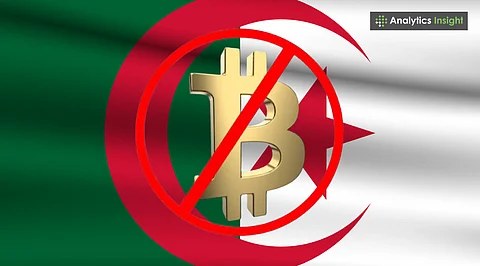

Algeria has enforced one of the strictest anti-cryptocurrency laws in the world, criminalizing all crypto-related activities. The new legislation, which took effect on July 24, 2025, makes it illegal to buy, sell, hold, trade, mine, or promote digital assets, including popular tokens like Bitcoin, Ethereum, and Tether.
The Algeria Crypto Ban has sparked global debate about financial freedom and digital sovereignty. The country's strict Cryptocurrency Regulation is aimed at curbing financial crimes and promoting centralized control.
Under this new law, individuals caught participating in any form of cryptocurrency activity could face two months to one year in prison, along with fines ranging from 200,000 to 1 million Algerian dinars (approximately $1,540 to $7,700). In more serious cases involving organized financial schemes or criminal networks, penalties may be significantly tougher.
Due to the Algeria Crypto Ban, investors face severe penalties for holding or trading any form of cryptocurrency. The legislation also places crypto under Algeria’s anti-money laundering (AML) and counter-terrorism financing (CTF) regulations, signaling the government's focus on national security and financial control.
Authorities argue that the crackdown is necessary to protect Algeria’s financial system from risks associated with illegal crypto activity. Officials have raised concerns over money laundering, tax evasion, and terrorism financing.
Additionally, the government is targeting unsanctioned crypto mining in southern Algeria, where tech-enthusiast youth are taking advantage of low-cost electricity. These operations are viewed as potential threats to national infrastructure and financial transparency.
Algeria's stance stands in contrast to the broader MENA region, where many neighboring countries are embracing crypto innovation. Morocco is working on regulatory frameworks, Tunisia has launched a digital sandbox for crypto startups, and Egypt allows licensed exchanges under strict oversight.
Declaring Bitcoin Illegal Algeria, the government has warned citizens against using decentralized currencies. The new AML Crypto Law is designed to monitor Algeria Digital Assets and prevent money laundering through crypto transactions.
Algeria's total prohibition positions it closer to countries like China, which have similarly banned crypto, rather than regulating it.
Also Read: Crypto Bans in 2025: 10 Countries Where It's Still Restricted
The Algerian government has intensified surveillance, enlisting financial authorities and law enforcement agencies to monitor online activity and enforce compliance. Users who rely on platforms like Binance or Bybit via VPNs are now at greater risk of prosecution.
However, the law notably allows exceptions for academic research, leaving a small space for non-commercial exploration of blockchain technology.
While the new law may limit illegal financial flows, critics warn it could also stop technological innovation, foreign investment, and economic growth. Algeria had previously ranked among the fastest-growing crypto markets in the region. With this new ban, the country has chosen strict control over potential benefits, setting itself apart in the global debate over how digital assets should be governed.
